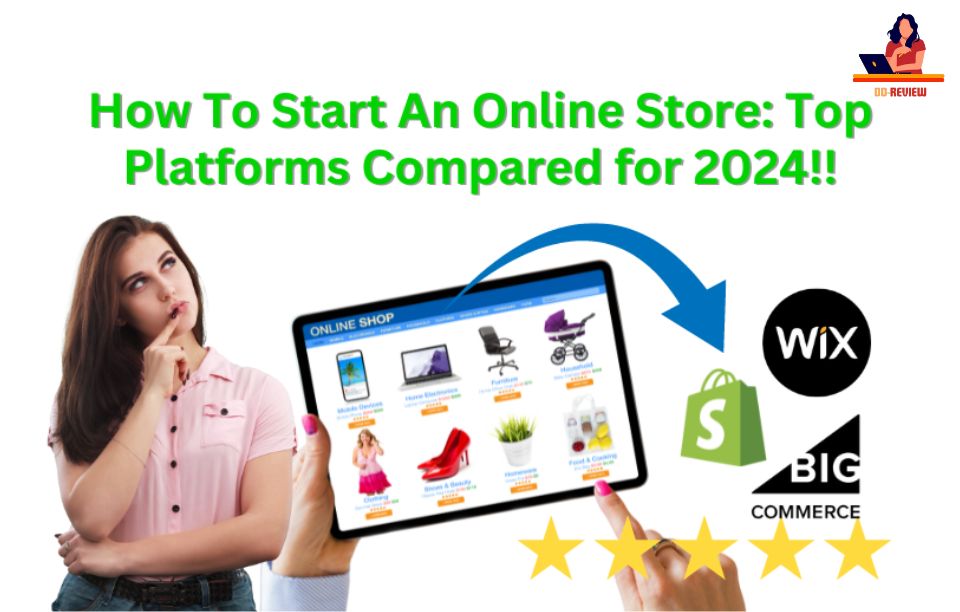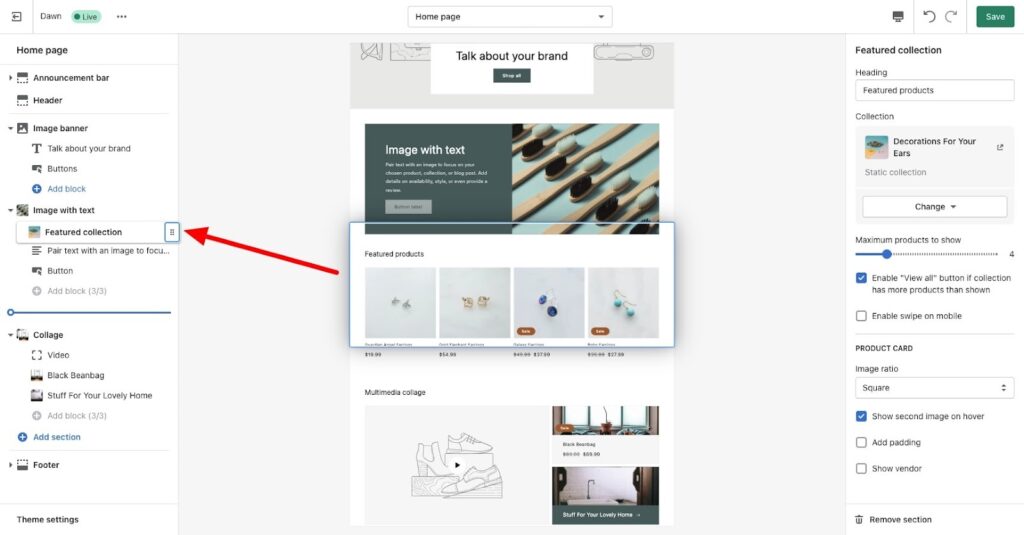How to Start an Online Store – Introduction
How to Start an Online Store – Starting an online store can feel daunting, especially with the multitude of platforms available today. Whether you’re seeking a straightforward solution or require advanced features to scale your business, choosing the right e-commerce platform is essential. In this article, we will compare the leading platforms for 2024, empowering you to make a well-informed choice and confidently launch and grow your online store.
Ease of Use – How to Start an Online Store
When considering how to start an online store, ease of use is often a crucial factor, particularly for beginners. The best e-commerce platforms streamline the setup process with features like drag-and-drop builders and intuitive interfaces, making it accessible for anyone to create a professional-looking store. Let’s explore how the top platforms excel in this area:
- Shopify – Shopify is renowned for its user-friendly setup. It allows users to customize their stores effortlessly, even without any coding experience. The platform provides a variety of templates and integrates seamlessly with numerous apps, enabling users to enhance their store’s functionality with just a few clicks. This makes Shopify an excellent choice for those who want to get started quickly and efficiently.
- Wix – Wix is particularly ideal for beginners, offering an easy-to-use drag-and-drop editor. This feature allows users to fully customize their store’s appearance without needing any technical knowledge. With a wide range of design options and templates, Wix empowers users to create a unique online presence that reflects their brand’s identity.
- BigCommerce – BigCommerce caters to those looking for more advanced features. While it may present a steeper learning curve for beginners, it compensates with comprehensive step-by-step guides that assist users throughout the setup process. This platform is perfect for those who anticipate scaling their business and require robust tools to support growth.
- WooCommerce – WooCommerce offers unparalleled flexibility, allowing users to tailor their online store to their specific needs. However, it requires managing hosting and a WordPress site, which can introduce a technical layer that may not be suitable for everyone. While it provides extensive customization options, beginners might find the initial setup more challenging compared to other platforms.
Launch with Assurance! Don’t wait any longer—explore our guide now and take the first step toward a successful online store!
Cost & Pricing Plans – How to Start an Online Store
Understanding the costs involved in starting an online store is crucial for budgeting and financial planning. Here’s a detailed breakdown of the pricing structures across popular e-commerce platforms, so you can make an informed decision:
- Shopify – Shopify offers a range of plans starting at $29 per month. This entry-level plan provides essential features to get your online store up and running. As your business grows and you require more advanced functionalities, you can upgrade to higher-tier plans, which range from $79 to $299 per month. It’s important to note that Shopify charges transaction fees on sales unless you use Shopify Payments, their own payment processing solution. This can affect your overall profitability, so be sure to factor that into your calculations.
- Wix – With Wix, e-commerce plans begin at $27 per month. The pricing can increase based on the additional features and storage space you choose. One significant advantage of Wix is that it does not impose any transaction fees, making it an appealing option for many businesses. This means you can keep more of your earnings, which is a crucial consideration for startups looking to maximize profits.
- BigCommerce – BigCommerce has a competitive pricing structure starting at $29.95 per month. What sets BigCommerce apart is its commitment to no transaction fees across all plans. This can be particularly beneficial for businesses with high sales volumes, as it allows you to retain more of your revenue. Additionally, BigCommerce provides robust features that cater to both small businesses and larger enterprises looking to scale.
- WooCommerce – WooCommerce operates a bit differently as it is a plugin for WordPress and is technically free to use. However, you’ll need to consider several additional costs. You’ll need to budget for hosting, which typically ranges from $10 to $30 per month, as well as domain registration, which usually costs around $10 to $15 per year. Furthermore, if you want to enhance your store’s functionality or design, you may also need to invest in premium themes and plugins, which can vary widely in price. This can make WooCommerce a more flexible option, but it also requires careful financial planning to avoid unexpected expenses.
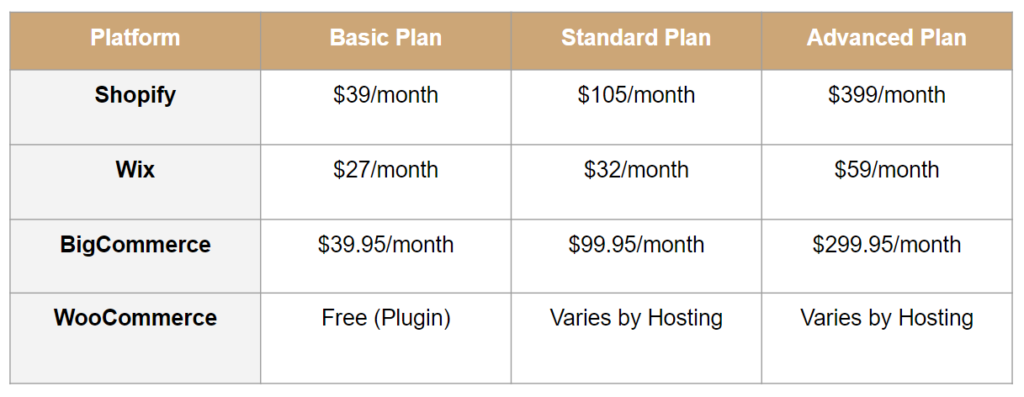
Pricing Plans Overview – How to Start an Online Store
When choosing an e-commerce platform, understanding the different pricing tiers and their associated features is crucial for selecting the right plan for your business needs. Here’s a closer look at the offerings from each platform along with important considerations regarding additional costs:
Shopify
- Basic Plan: Ideal for new businesses, this plan provides essential e-commerce features such as online store creation, social media integration, and payment processing. It’s a great starting point for entrepreneurs looking to establish their footprint in the online market.
- Standard Plan: This plan is designed for growing businesses and includes additional features like professional reports and enhanced shipping options. It supports scaling operations by providing tools that help streamline order management and customer engagement.
- Advanced Plan: For businesses that require in-depth analytics and advanced shipping capabilities, this plan includes features like advanced reporting and third-party calculated shipping rates. This is particularly beneficial for larger businesses with complex shipping needs and a desire for detailed performance insights.
Wix
- Basic Plan: The Basic plan encompasses essential e-commerce features, making it suitable for small businesses that want to get started quickly without overwhelming complexity.
- Standard Plan: This tier provides more storage and additional features, enabling users to expand their online store’s capabilities. It’s a solid choice for businesses that have outgrown the Basic plan and need more flexibility.
- Advanced Plan: This plan offers even more storage, features, and enhanced support options, catering to businesses that require robust functionality and customer service as they scale.
BigCommerce
- Basic Plan: The Basic plan is tailored for startups, offering essential features necessary for launching an online store, including product listings and payment processing.
- Standard Plan: This plan includes more advanced features, such as abandoned cart recovery and product filtering, making it suitable for businesses ready to enhance their customer experience.
- Advanced Plan: Designed for established businesses, this plan offers extensive customization options and B2B features, making it an excellent choice for those looking to cater to wholesale customers or require tailored solutions.
WooCommerce
WooCommerce is a free plugin for WordPress, but the overall costs can vary significantly depending on your choices for hosting providers and any additional plugins or themes you decide to incorporate. While the flexibility of WooCommerce allows for a highly customized online store, it also requires careful budgeting to account for necessary expenses.
Additional Cost Considerations
Regardless of the platform you choose, it’s essential to consider several additional costs that can accumulate quickly:
- Domain Registration: Typically costs around $10 to $15 per year, but it’s necessary for establishing your online identity.
- Third-Party Apps: Many platforms offer integrations for additional functionalities, which often come with their own costs.
- Transaction Fees: Depending on your chosen platform and payment processor, transaction fees can significantly impact your overall expenses, especially as your sales volume increases.
Shape Your Future! Empower your online business journey by reading our article on the best e-commerce platforms for 2024!
The Importance of Customizability – How to Start an Online Store
Customizability plays a vital role in shaping your brand identity and enhancing user experience. A robust e-commerce platform should empower you to tailor your online store’s layout, colors, and functionalities to perfectly reflect your brand’s personality. Let’s delve into how various platforms approach customization:
Shopify
Shopify provides an impressive selection of professional themes, both free and paid, that serve as the foundation for your online store’s design. Users can easily customize these themes to align with their branding through an intuitive interface.
However, for those looking to implement more advanced customizations—such as unique layouts or intricate design elements—some knowledge of Liquid, Shopify’s proprietary coding language, may be necessary. This means that while Shopify is accessible for beginners, it also caters to developers who wish to push the envelope further.
Wix
Wix is renowned for its unparalleled flexibility, allowing users full control over the design of their online store through a user-friendly drag-and-drop builder. This platform enables users to modify virtually every element of their site, from fonts and colors to layouts and images, all without requiring any coding skills.
This level of customization is particularly advantageous for small business owners and creatives who want to establish a distinctive brand identity while enjoying a straightforward design process.
BigCommerce
BigCommerce offers a diverse array of customization options, featuring both free and premium themes that users can adapt to meet their branding needs. The platform provides a solid set of built-in features that allow for significant modifications.
However, for more complex customizations—like advanced functionality or unique design elements—users may need to enlist developer support. This makes BigCommerce a great choice for businesses that foresee growth and require a platform that can evolve with them, albeit with some technical assistance for intricate alterations.
WooCommerce
WooCommerce, being built on WordPress, is one of the most customizable options available. It grants users access to thousands of themes and plugins, enabling virtually limitless possibilities for design and functionality. Whether you’re looking to create a unique layout, add specific features, or integrate third-party services, WooCommerce provides the tools to do so.
This flexibility makes it particularly appealing to entrepreneurs who want to create a highly personalized online shopping experience while leveraging the extensive capabilities of the WordPress ecosystem.
Effective Inventory and Product Management in E-Commerce – How to Start an Online Store
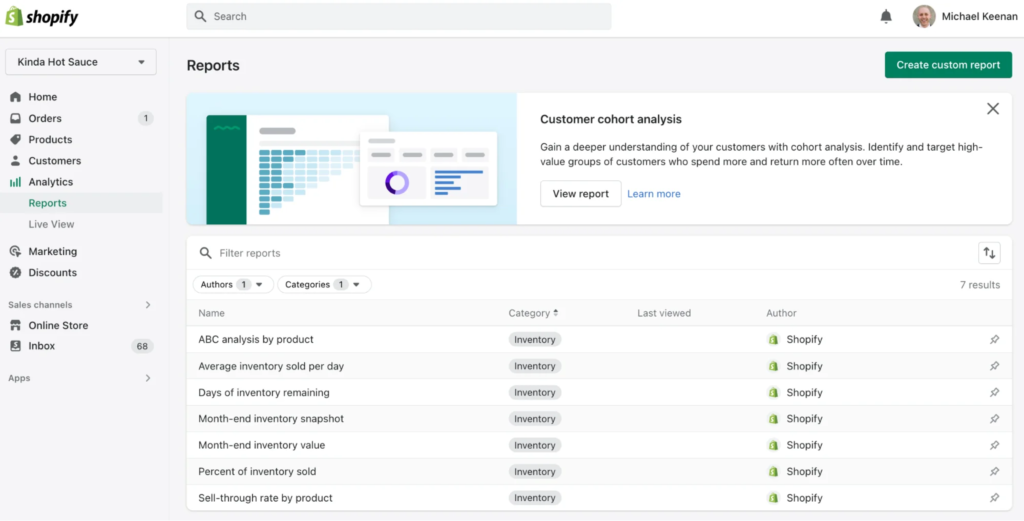
Managing your inventory and products efficiently is crucial for the success of any e-commerce store. A well-structured inventory system not only helps in maintaining stock levels but also enhances customer satisfaction by ensuring that products are available when needed. Here’s how the leading e-commerce platforms compare in terms of inventory and product management capabilities:
- Shopify – Shopify excels in providing a user-friendly interface for adding and managing products. Users can easily create product listings, add multiple variants (such as size and color), and track inventory levels on a per SKU basis. This feature is particularly beneficial for businesses with diverse product lines, as it allows for precise inventory management. Additionally, Shopify supports dropshipping directly within the platform, enabling users to manage their inventory without holding physical stock. This flexibility makes Shopify a strong choice for both small and growing businesses looking to streamline their operations
- Wix – Wix offers basic product management features that include support for product variations, allowing users to customize their offerings to some extent. However, while Wix is suitable for smaller stores, its inventory management options may be somewhat limited for larger businesses with extensive product catalogs. This could pose challenges for those looking to scale, as the platform may not provide the robust tools needed for complex inventory management.
- BigCommerce – BigCommerce is known for its powerful product management tools, making it an excellent choice for businesses with complex inventories. The platform excels in handling bulk pricing, multi-channel sales, and extensive product variations. This capability allows businesses to manage large inventories efficiently and sell across various platforms seamlessly. BigCommerce’s advanced features cater to both small businesses and larger enterprises, providing the necessary tools to optimize inventory management and enhance sales strategies.
- WooCommerce – WooCommerce, built on the WordPress framework, offers a high degree of flexibility in product management. Users can add an unlimited number of products and customize various attributes to suit their needs. However, managing a large inventory may require additional plugins to ensure smooth operations and optimal performance. This means that while WooCommerce provides extensive customization options, users should be prepared to invest in supplementary tools to handle larger inventories effectively.
Simplify Your Search! Read our in-depth analysis of e-commerce platforms to find the straightforward solution or advanced features you need.
Payment Options & Security – How to Start an Online Store

Offering a variety of secure payment options is essential for building customer trust and ensuring a smooth shopping experience. Here’s a detailed breakdown of the payment options and security features provided by leading e-commerce platforms:
Shopify
Shopify stands out by supporting over 100 payment gateways, including popular options like Shopify Payments, PayPal, and Stripe. This extensive range allows merchants to cater to diverse customer preferences, enhancing the likelihood of completed transactions.
Additionally, Shopify includes SSL certification for all stores, ensuring that customer data is encrypted and secure during transactions. This commitment to security helps protect both the merchant and the customer from potential fraud.
Wix
Wix also offers a variety of payment methods, including PayPal, credit cards, and Stripe. Similar to Shopify, all Wix plans come with SSL security, which safeguards sensitive information during the payment process.
While Wix provides essential payment options, it is particularly well-suited for smaller businesses or those just starting out, as it simplifies the payment setup process without overwhelming users with too many choices.
BigCommerce
BigCommerce integrates with over 65 payment gateways, providing a solid selection for businesses of all sizes. The platform is known for its strong security features, including SSL certification and PCI compliance, which ensures that all transactions meet industry standards for security.
This makes BigCommerce a reliable choice for businesses that prioritize security and want to offer a seamless checkout experience across multiple sales channels.
WooCommerce
WooCommerce is highly flexible when it comes to payment options, accepting all major gateways such as Stripe and PayPal. However, it’s important to note that SSL certificates and PCI compliance are managed through your hosting provider, which means that users need to ensure their hosting service meets these security standards. This can add a layer of complexity for those unfamiliar with web hosting, but it also allows for greater customization and control over the payment process.
SEO and Marketing Tools – How to Start an Online Store

To attract traffic and drive sales for your online store, effective SEO and marketing tools are essential. Here’s a detailed comparison of how various e-commerce platforms rank in terms of their SEO capabilities and marketing features:
Shopify
Shopify provides a solid foundation for SEO with built-in tools that help optimize your store for search engines. Users can easily edit meta tags, create SEO-friendly URLs, and generate sitemaps, which are crucial for improving visibility in search results.
Additionally, Shopify offers a variety of marketing integrations, including tools for email campaigns and social media selling. This allows merchants to reach their audience effectively and engage customers through multiple channels, enhancing overall marketing efforts.
Wix
Wix includes basic SEO tools that help users optimize their websites, such as customizable meta tags and alt text for images. However, these tools are more limited compared to those offered by Shopify and BigCommerce.
Despite this, Wix does provide integrated email marketing options, allowing users to create and manage email campaigns directly from the platform. This can be beneficial for small businesses looking to maintain customer engagement without needing extensive technical knowledge.
BigCommerce
BigCommerce is recognized for its robust SEO features, making it an excellent choice for businesses aiming to scale through organic search. The platform offers advanced SEO capabilities, including customizable URLs, automatic sitemaps, and rich snippets for product listings.
These features help improve search engine rankings and drive more traffic to your store. Additionally, BigCommerce supports various marketing tools that facilitate multi-channel selling, allowing businesses to reach customers across different platforms effectively.
WooCommerce
As a WordPress plugin, WooCommerce offers superior SEO capabilities, particularly when paired with plugins like Yoast SEO. This combination allows users to optimize their product pages, manage keywords, and analyze content for SEO effectiveness.
WooCommerce also supports the integration of third-party email marketing and social media tools, providing flexibility for businesses to tailor their marketing strategies. This makes WooCommerce a powerful option for those who want to leverage the extensive SEO features available within the WordPress ecosystem.
Get Started Today! Equip yourself with the knowledge to select the right e-commerce platform and take the first step toward building your online store.
Scalability – How to Start an Online Store
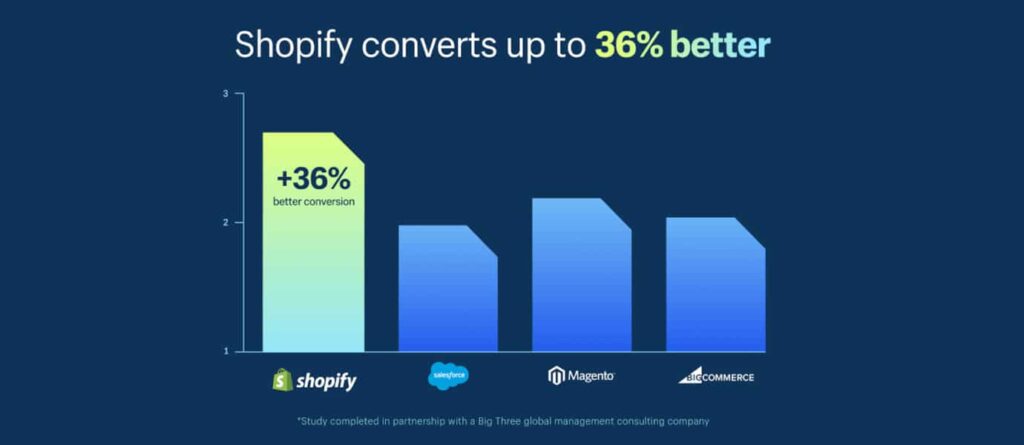
As your online store grows, choosing a platform that can scale with your business is crucial for long-term success. Scalability ensures that your e-commerce solution can handle increased traffic, larger inventories, and more complex operations without compromising performance. Here’s how the leading platforms perform in terms of growth potential:
Shopify
Shopify is particularly well-suited for scaling businesses, offering advanced plans that come with features designed to support growth. These plans include advanced reporting tools that provide insights into sales trends and customer behavior, enabling data-driven decision-making.
Additionally, Shopify offers automation features that streamline operations, such as automated inventory management and order processing. For businesses with higher sales volumes, Shopify reduces transaction fees, making it more cost-effective as you grow. This combination of features makes Shopify a strong contender for businesses aiming to scale efficiently and effectively.
Wix
While Wix is an excellent choice for beginners and small businesses, it may not be the best option for high-volume stores or those with complex inventory needs. As your business expands, you might find that Wix’s capabilities become limiting, particularly in areas like multi-channel selling and advanced analytics.
This could hinder your ability to manage a growing customer base and product range effectively. Therefore, while Wix is user-friendly and accessible, it may not provide the scalability required for larger e-commerce operations.
BigCommerce
BigCommerce excels in scalability, making it an ideal platform for businesses looking to grow significantly. It offers a comprehensive suite of tools designed for expanding stores, including features for multi-channel selling, which allows you to reach customers on various platforms like Amazon and eBay.
Additionally, BigCommerce includes B2B features that cater to wholesale operations, enabling businesses to diversify their sales strategies. The platform also provides advanced analytics tools that help track performance and optimize marketing efforts, making it a robust choice for businesses aiming for substantial growth.
WooCommerce
WooCommerce is highly scalable due to its integration with WordPress, which allows for extensive customization and flexibility. However, as your business grows, you may need to invest in better hosting solutions, enhanced security measures, and performance optimization tools to maintain a smooth user experience.
While WooCommerce can handle large inventories and complex product setups, the responsibility for scalability largely falls on the user, requiring a proactive approach to ensure that the platform can support increased traffic and sales.
The Importance of Customer Support – How to Start an Online Store
When starting an online store, having access to reliable customer support is crucial for navigating challenges and ensuring smooth operations. Effective support can save you time, reduce stress, and help you maintain a positive shopping experience for your customers. Here’s an overview of the customer support options offered by various e-commerce platforms:
Shopify
Shopify provides robust customer support available 24/7 through multiple channels, including chat, email, and phone. This ensures that users can reach out for assistance whenever they encounter issues or have questions, making it a dependable option for both new and experienced merchants.
In addition to direct support, Shopify boasts a comprehensive help center filled with articles, guides, and tutorials that cover a wide range of topics. Furthermore, the active community forums allow users to connect with other Shopify merchants, share experiences, and seek advice, fostering a supportive environment for learning and problem-solving.
Wix
Wix also offers 24/7 support, but it is important to note that this service is available via chat and phone only for premium users. This tiered support model means that those on lower-tier plans may have limited access to immediate assistance.
However, Wix provides an extensive help center filled with tutorials and resources to guide users in troubleshooting common issues and maximizing the platform’s features. This can be particularly helpful for less complex questions or tasks, making it easier for beginners to find the information they need.
BigCommerce
BigCommerce excels in customer support, offering 24/7 live support through phone, email, and chat. This comprehensive support ensures that businesses can receive help at any time, which is especially important for e-commerce operations that may experience issues outside of regular business hours.
In addition to live support, BigCommerce provides a large resource library that includes articles, videos, and guides on various topics, enabling users to find solutions independently and learn more about best practices for running their online stores.
WooCommerce
WooCommerce support primarily relies on WordPress forums and third-party hosting providers. This means that while there is a wealth of community-driven knowledge available, the support experience can be less direct compared to other platforms. Users may need to navigate forums for solutions or rely on their hosting provider for technical issues.
However, some premium plugins do offer dedicated support, which can enhance the overall experience for users who opt for those additional features. This model can work well for technically savvy users but may pose challenges for beginners who prefer more straightforward access to support.
Unlock Your Potential! Discover which platform offers the features you need to scale your online store successfully—read more now!
How SaleHoo Can Help Beginners Start an Online Store
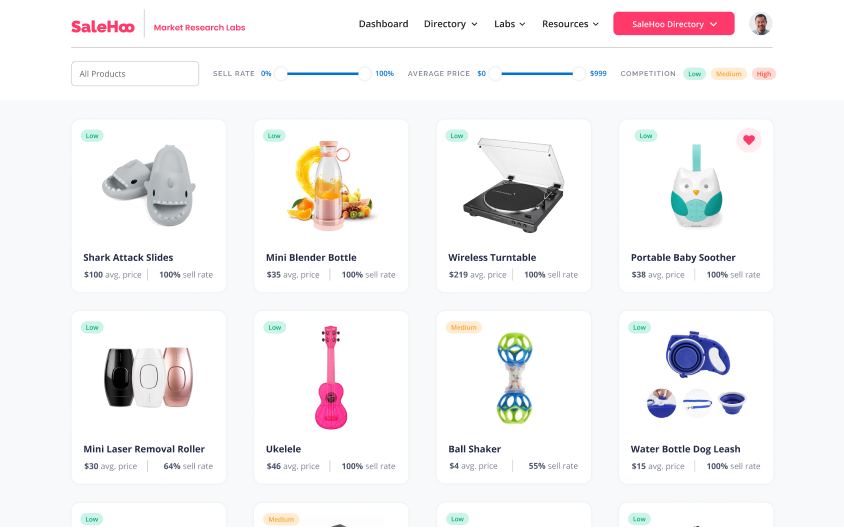
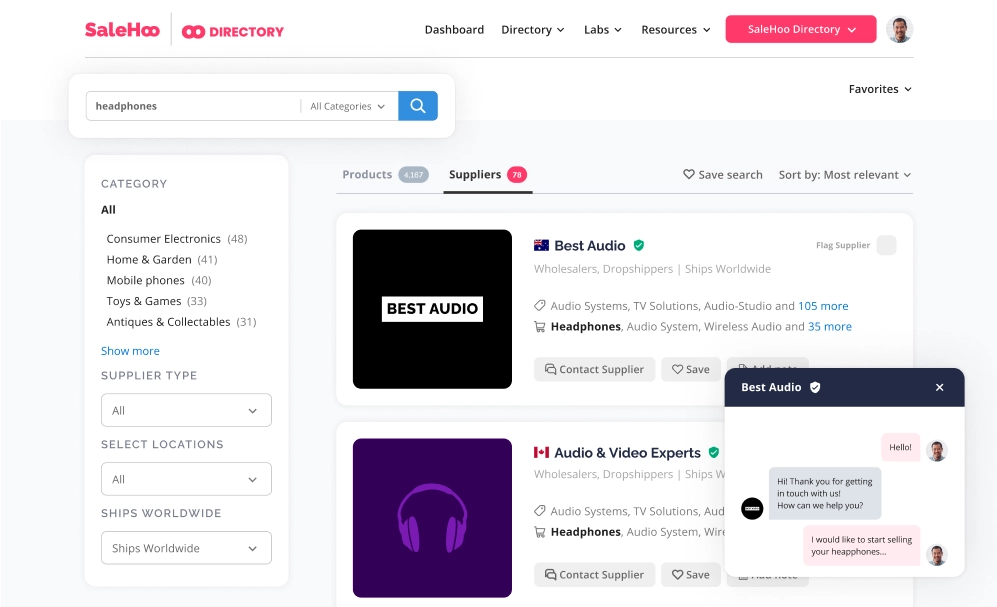
For beginners venturing into the world of online retail, the challenge of finding reliable suppliers and selecting the right products to sell can often feel overwhelming.
This is where SaleHoo proves to be an essential resource. SaleHoo is a comprehensive directory of vetted suppliers and wholesalers, designed to simplify the sourcing process and help you access products at competitive prices without the worry of encountering unreliable vendors.
With a vast network of over 8,000 suppliers and an impressive catalog of more than 1.6 million products, SaleHoo streamlines the drop shipping and wholesale sourcing experience. This makes it an ideal platform for newcomers who want to kickstart their e-commerce journey with confidence.
By connecting users with trustworthy suppliers, SaleHoo allows aspiring entrepreneurs to focus on building their brand and marketing their products, rather than getting bogged down by the complexities of sourcing. Whether you’re looking to dropship or purchase wholesale, SaleHoo provides the tools and resources necessary to help you succeed in the competitive online marketplace.
One of the most significant hurdles faced by new e-commerce store owners is identifying reliable suppliers who can deliver quality products promptly. SaleHoo alleviates this concern by providing access to a network of verified suppliers, complete with detailed information about each one, such as minimum order quantities and shipping regions. This transparency helps beginners sidestep common pitfalls, ensuring a seamless experience from product sourcing to customer delivery.
In addition to supplier verification, SaleHoo offers a wealth of training resources, including comprehensive guides and video tutorials. These materials cover essential topics such as how to start an online store, select profitable niches, and effectively market your products. This hands-on support is invaluable for newcomers who require step-by-step assistance as they navigate the complexities of building their stores.
If you’re eager to dive into the world of e-commerce but don’t know where to begin, SaleHoo can simplify the process of finding the right suppliers and products. Start your journey with SaleHoo today to gain access to thousands of trusted suppliers and launch your online store with confidence!
Related Article: SaleHoo Review: Exploring Legitimacy and User Experiences
Conclusion – How to Start an Online Store
In Conclusion, Launching an online store in 2024 presents a thrilling opportunity for profitability, especially when you choose the right platform to facilitate your growth. Whether you are a complete novice or seeking to expand an existing business, the platforms we’ve discussed — Shopify, Wix, BigCommerce, and WooCommerce—each offer distinct advantages tailored to different requirements.
If your focus is on user-friendliness and a swift setup, Shopify and Wix are excellent choices. For those aiming to scale quickly or manage extensive inventories, BigCommerce stands out with its powerful features and scalability options. On the other hand, WooCommerce is perfect for those who desire full customization and are comfortable navigating the technical aspects of WordPress.
As you consider which platform to adopt, it’s crucial to align your choice with your long-term business objectives. Evaluate essential factors such as cost, scalability, SEO capabilities, and customer support, as these elements will significantly influence your store’s success. With the right platform in hand, you will be well-equipped to embark on your journey toward establishing a thriving online store that continues to grow well into 2024 and beyond.
Make Informed Decisions! Check out our comparison of e-commerce platforms to choose the one that aligns with your business goals and needs.
Affiliate Disclosure:
I prioritize unbiased perspectives in my content without being swayed by financial incentives. Nonetheless, I partner with specific retailers through affiliate programs to support this website, enabling me to continue offering valuable insights supported by thorough research and practical knowledge. If you make purchases through the links on this page, I may earn modest commissions, which doesn’t increase your costs.

